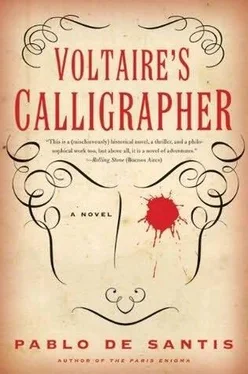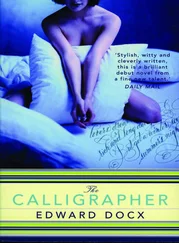1 ...7 8 9 11 12 13 ...26 One night I found a message signed A friend of V . on my pillow, asking me to come to Les Cordeliers. I had no idea how it got there, and my apprehension only grew as I walked to the Pension d’Espagne. The door was open, but the rooming house appeared to be empty; I went from room to room, afraid I’d be mistaken for a thief, until I found a man in bed, empty beds all around him, with blankets pulled up to his nose. My obvious unease identified me as his guest, and he beckoned me in.
I sat a prudent distance away, afraid he might be hiding his face because of some illness. With the covers still over his mouth, he told me his name: Beccaria. He pronounced it decisively, as if that one word were enough to erase all fear. I had once seen a portrait of Beccaria, but I distrusted painters, so generous with the distribution of balance and beauty. In any event, the man’s face was still obscured, and I was afraid he could be an impostor. Voltaire had written a brief essay praising Beccaria’s book- Of Crimes and Punishments -but no one believed it was his. That same curse had always plagued Voltaire: his authorship was questioned whenever he signed his work, while every unsigned satire was immediately attributed to him.
“Mutual friends asked me to contact you. They’re waiting for news at the castle.”
“And I’m waiting for money. Do you have any for me?”
“I’ve got nothing to do with that. I’m simply offering to take your message to the border.”
“How do I know I can trust you? Your fame reached the farthest corners of Europe, yet here you are, in a rooming house for the poorest court workers.”
“There are spies everywhere. My enemies hire enemies who hire enemies.”
“Who are they? Are they in the priesthood?”
“I wish. My enemies are people who used to be my friends. They know me and can therefore predict my next steps. I have to become someone else in order to hide, and then I do things I detest. But only as another can I be safe.”
His accent and the blanket over his mouth made him hard to understand, but I soon gathered he was telling me the story of his life. Beccaria had never been interested in justice, the topic that had made him so famous, until one day, more out of friendship than any real interest, he joined a group of intellectuals from Milan who established a journal called Il Caffè .
“I actually liked math, but everyone around me was a writer. I never could stand to hold the pen for long; it made me sleepy. My friends, particularly the Verri brothers, worked tirelessly. I wanted to chase women, go out on the town, as we used to, but the publication was so important to them that I had to keep quiet. They were annoyed by my lack of drive, and Alessandro Verri wound up threatening me: they would kick me out if I didn’t get to work. I asked him to give me a topic to write on; he suggested justice. I recalled the walks we used to take, when we would discuss The Spirit of the Laws all night long. I decided to maintain the tone of those aimless conversations in my piece. When I started to write, I carried a list of the people executed in Milan as a sort of amulet. Every afternoon, before dipping my quill in ink, I would recite: Massimo Cardacci, hanged; Renzo Zarco, dismembered; Vittorio Lapaglia, decapitated, his remains thrown in the river; and this one hanged as well, and that one put to death on the wheel, then burned at the stake in the square. My friends would laugh whenever I read that list as if it were a spell to give me power over words, but they all encouraged me when they saw that it worked.”
Beccaria jumped out of bed and began to get dressed. He looked like a mere sketch of his own portrait: his clothes hung off him as if he had suddenly lost weight. He moved as if he were sleepwalking.
“I put the book together bit by bit, like a woman sewing a dress out of scraps of material. My friends helped me edit it and kindly gave it to a printer. Friends can be so helpful when they doubt your ability! But as soon as they know what you’re worth, they turn against you. There’s nothing worse than literary envy. The Verri brothers have slandered and hounded me ever since. Not even the Venetian Council of Ten attacked me as viciously as my old friends! They’ve accused me of being an impostor; criticized my appetite, my vulgarity; and even taken advantage of one time when I was startled by a spider to call me a coward.”
He opened the trunk and attempted to tidy things; his clothes were dirty and wrinkled, his books missing covers and falling apart.
“Write your message and I’ll deliver it,” he said more calmly now.
As Beccaria dressed, I took a quill and ink out of my bag and used the trunk as a writing surface. I started by recounting recent events and then outlined my next steps; fearing the messenger might be a spy, I spoke indirectly, using subtext and subterfuge.
Beccaria would look out the window, leap from one side of the room to the other, stop to listen to footsteps on the stairs. He saw signs of danger in everything, and his fear was so contagious it made my prose even more obscure.
“You’ve no idea how I’ve dreamed of going to Ferney. Arriving there will be like crossing the border between my past and my future. What can I take Voltaire? I was thinking about a clock.”
“Anything but. Perk up your ears, go to the theater, stop to listen to what people around you are saying, and then describe all of it, in as much detail as possible. Voltaire has received every imaginable gift, but words are all that interest him.”
My letter never reached Voltaire. Beccaria suddenly changed direction and headed for Milan. It was all the fault of a sick woman he saw on the street. He was so moved by the sight of her that he imagined his own wife ill and destitute and returned home as quickly as he could. Signora Beccaria was as healthy as ever, but her husband never traveled again. He spent the rest of his life out of the spotlight, as a teacher. He and the Verri brothers never exchanged another word. The brothers had this to say to anyone who would listen: “Piece of advice? Never help anyone out of their boredom and apathy.”
My letter lay forgotten in Beccaria’s suitcase. He discovered it years later and, guilt ridden, sent it to Ferney. It reached me after Voltaire had died, when I was organizing the archives. I had written it in one of my experimental inks, and every single word had disappeared in the intervening seventeen years. Only a few strokes remained, the heaviest ones, which now reminded me of bird tracks in the sand.
The Siccards were a family of papermakers who over the years had expanded into quills and inks. They raised their own geese, a Belgian breed with blue and gray feathers, which they hardened in glass soot heated in an iron furnace. The founder of the family business, Jean Siccard, had died two years earlier, and the business, mismanaged by his son, had been on the verge of closing. In recent months, however, the young Siccard had found his way. Now, the moment a customer walked through the door, there was an array of quills organized in large drawers, sheets of marbled paper, accounting ledgers, hand-drawn staff paper, and Chinese cartographic materials.
When I arrived, an employee was preparing an order for the courts. I showed him the letter from Abbot Mazy, and he looked at me in alarm, possibly because there were other people in the room. He motioned for me to go into the back, in more of a hurry to get rid of me than actually indicate the way. I had no idea what the letter said or what ruse the abbot had employed to get me hired at Siccard House. I went down the hall, passing an employee up to his elbows in paper pulp, and found a staircase behind a folding screen adorned with Arabic script.
Читать дальше
Конец ознакомительного отрывка
Купить книгу












